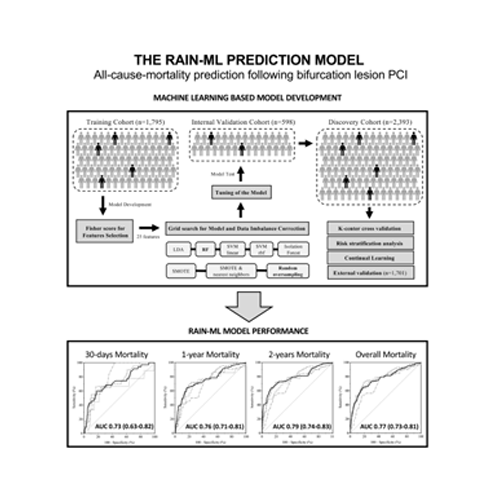The RAIN-ML Prediction Model
RAIN-ML
Coronary artery disease is the leading cause of death world-wide. Percutaneous coronary intervention (PCI)
represents the treatment of choice in case of acute or chronic coronary stenosis. The continuous improvement of stent technology and implantation techniques has translated into improved clinical
outcomes following PCI, in complex anatomical and procedural settings such as coronary bifurcation lesions.
In this context, the stratification of patients according to their risk of post-PCI all-cause mortality may have an impact on clinical decision making and personalized medicine. Traditional risk assessment is performed using a limited number of variables, potentially omitting routinely assessed, powerful outcome predictors.
Moreover, already available models for risk prediction following PCI, focused on either clinical or anatomy/procedure parameters, rather than exploiting a multidimensional evaluation by integrating all
these factors, especially in the setting of coronary bifurcation lesions.
Artificial intelligence and learning algorithms are a powerful approach to circumvent the limitations of current risk stratifications methods, by applying a computational approach and integrating several, multiparametric variables, capturing high-dimensional, non-linear relationships among clinical features to make data-driven outcome predictions. The effectiveness of this approach has been shown across several cardiovascular applications, where machine learning (ML) was superior to traditional models for risk assessment.
Therefore, we developed and validated the RAIN-ML prediction model, which integrates clinical, anatomical and procedural features to predict mortality following bifurcation PCI, utilizing a large international cohort of patients, including 4,094 subjects undergoing coronary bifurcation PCI with contemporary stents.
Contacts:
Fabrizio D’Ascenzo
